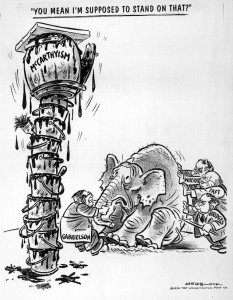No Sense Of Reality: Reason‘s Why  ![McCarthyism[1]](http://www.themanwholostchina.com/wp-content/uploads/2010/09/McCarthyism1-150x150.jpg)
Those libertarian kids at Reason magazine are rightly concerned the with the endless reuse of McCarthyism, the term losing all bite and meaning as it slops around political commentary.
Not that they don’t dabble in it themselves, as a tool to attack opponents of a beloved climate change denier, or when pulling the grand switcheroo:  discovering the dread McCarthyism Of The Left.
“Even after September 11, left-wing McCarthyism persists on American campuses.“
But the magazine is really more concerned with minimizing McCarthy, salvaging the kernels of truth they like to imagine he built his career around.
Because after all, the Reds had it coming.
Reason‘s Cathy Young just can’t stop rediscovering the left in all the wrong places, and she won’t let those stalinoid liberals paint themselves as victims:
“There is a reason the Hollywood Left clings to what the Radoshes call the “fable of innocence destroyed by malice.” This fable props up its moral authority to this day. From the height of this authority, today’s celebrity radicals blast American policies while ignoring the evil of a Saddam Hussein.“
Evil ignoring was more in this  fellow’s line of work, and the authority of today’s celebrity radicals no doubt explains why everybody remembers when they first gave a sawbuck to Ed Asner’s Medical Aid To El Salvador.
fellow’s line of work, and the authority of today’s celebrity radicals no doubt explains why everybody remembers when they first gave a sawbuck to Ed Asner’s Medical Aid To El Salvador. 
Reason‘s writers spend inordinate amounts of time trying to salvage real facts they like to imagine the Red Scare exposed.
Sister Young again:
“… in the case of McCarthyism, the stubborn blindness of leftists and many liberals both to the brutality of the Soviet regime and to the extent of Soviet espionage during the Cold War undoubtedly helped create fertile ground for Coulter-style polemics.”

First, stop channeling David Horowitz. Second, in what parallel universe was Ann Coulter ever concerned with facts? And third, remember NATO, federal worker loyalty boards and the Attorney General’s list? Proud Truman achievements.
In Stan Evans’ McCarthy-Was-Right book Blacklisted by History, highly charitable Reason-ette Michael Moynihan found the hidden pony about Owen Lattimore, and a role model. Because after all, “A book can be radically wrong in its conclusions and devilishly selective in its presentation of evidence yet still be useful.”
What Moynihan finds useful is imagining Evans provides “a much needed corrective to the widely held view, successfully advanced by [Owen] Lattimore himself, that he was in fact a generic New Deal liberal and an anti-communist.”
Both in defending Evans [with an asterisk] and praising David Aaronovitch‘s Voodoo Histories: The Role of Conspiracy Theory in the Shaping of Modern History, Moynihan turns to the same would-be damning Lattimore quote on Soviet collective farms.
Moynihan’s version has Lattimore writing that they were:
“a kind of ownership more valuable to [the Soviet peasantry] than the old private ownership under which they were unable to own or even hire machines.â€
No doubt Lattimore wrote unfortunate things about the Soviet Union, but the quote above is only part of a paragraph in language you might not expect from a straight Soviet apologist.
“The identification between loyalty to the government and devotion to one’s own kind of property is a political law that is valid even in Soviet Russia. Divided loyalties weakened Russia most in the terrible and bloody struggle over collectivization, a thinly disguised civil war in which land was taken from the rich peasants and given to poor peasants, not individually but as members of collective farms. Since then, a new kind of loyalty has gradually solidified as more and more Soviet peasants in the Ukraine, Russia, Siberia, and Soviet Asia have come to feel that their individual shares in collective farms represent a kind of ownership more valuable to them than the old private ownership under which they were unable to own or even hire machines.”
I’m not certain what Lattimore meant by all this, but Kulak blood doesn’t go unacknowledged.
Aaronovitch brings out the true Lattimore obsessive in Moynihan when he points to the difficulty in squaring Lattimore as apologist with the steady stream of Lattimore denunciations and critiques in the Communist press. Somehow Moynihan thinks this is refuted by Communist attacks elsewhere on left deviationists.
“It was, Aaronovitch writes, absurd that “someone as nonrevolutionary†as Lattimore, who “had been attacked†in the communist press, could be denounced as a Red agent. But attacks from communist writers or newspapers mean nothing (as the Spanish Civil War demonstrated, communists were more interested in attacking so-called left deviationists than members of the fascist ruling class)…”
I think he is implying that Lattimore was both a Stalinist and a POUM-ist.
Moynihan has become almost manic about force-feeding Lattimore into political consciousness, roping him with Alger Hiss to make a point about Scott Brown’s base:
“…Tea Party crowd, people who previously thought of Massachusetts as a state that would vote an Alger Hiss/Owen Lattimore ticket if given the chance.”
….sparking a reader commentery war over whether anyone recalled who Lattimore was.
Reason-ettes live in a magical place, where demagogues require facts to bolster their power building crusades.
This is a willfully naive view of the world, on a par with their touching faith in the market solving any question society ever struggled over, without all that sweaty politics.
Chicago once enjoyed the comic stylings of mayoral spouse Jay McMullen, Mr. Jayne Byrne, who did his best to be a hard drinking parody of a city hall cynic. But he once stumbled onto the truth, when he observed that “the trouble with reformers is that they think everything is on the square.”






 “Racist!
“Racist!
![McCarthyism[1]](http://www.themanwholostchina.com/wp-content/uploads/2010/09/McCarthyism1-150x150.jpg)



